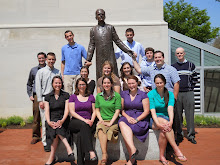Thursday, January 22, 2015
Why did John Paul II write a Theology of the Body?
Time for the Family
1/22/2015
RColeman
,
St. John Paul II
,
Theology of the Body
,
TOB
No comments
:
Here it is folks. The definitive explanation of John Paul II’s Theology of the Body, the one that will answer all your questions from, “Hey, what is a catechesis, anyway?” to, “Isn’t the body a natural thing? Why does it also need to be theological?” You’ll find all the answers below.
Obviously I’m kidding.
A great deal of ink has already been spilled over the series of Wednesday catecheses the late great pope delivered over the course of five years which have become known popularly as the “Theology of the Body,” (TOB) and undoubtedly, more will be spilled for many years to come. St. John Paul II’s writings on this topic are quite long, quite dense, and of course, quite beautiful.
They’ve garnered attention since St. John Paul II began them, and they will continue to do so because they tend to strike a chord with people, as the saint himself does. There is something both astonishing and yet deeply resonant, especially in our current cultural situation, about someone telling us not only that our bodies matter, but that it is precisely the body which opens up our horizons, that relates us to each other, and even to our Creator.
But these things take some unpacking, which explains the aforementioned ink-spilling, and also why, for the next couple of months, I too will be writing on TOB. I hope here to draw attention to some less commonly highlighted aspects of the work. I should also mention that my attempts will in no way be exhaustive.
I’d like to start with the question of why John Paul II wrote and delivered the Wednesday Catecheses. It seems to me that TOB is commonly framed in terms of sex and marriage, but often is not given a great deal of attention outside of that context. The problem with that approach is that the body doesn’t come into play only when it comes to sex and/or marriage. Rather, bodiliness is the human reality, the one we all share, despite myriad other differences, and it is therefore something we have to deal with, in one form or another, all the time. I am embodied from the beginning, not just when I start thinking about getting married.
Let’s be clear: I’m not saying that TOB has nothing to do with sex and marriage or vice versa. I’d just like to broaden the context in which we think about it. Which leads me again to my titular question: Why did John Paul II write a Theology of the Body?
We’ve pointed out a couple times already on this site that an understanding of freedom as a lack of constraint or limits is insufficient to our experiences and desires (see here and here). However, we deal with this modern concept of freedom all the time, and we see its marks on all things in our society.* But freedom from constraints/freedom from limits comes up against a very real and unavoidable limit rather quickly: the body. It’s just human existence: I am limited, not only temporally speaking (i.e., birth and death), but also spatially/physically. I can’t walk through walls. Flying isn’t an option for me like it is for the birds, nor is swimming in the way a whale can. Of course, man can “push himself to the limit” physically, but there is always a limit.
But this bodily limit is a roadblock for a modern conception of freedom. A body gets in the way of my potential-to-be-unfettered. And so, perhaps unsurprisingly, we see the body being attacked in many different ways today. Our anthropology—the way we view ourselves, what we think the meaning of mankind is—is one which looks down on the body, sees it, ultimately, as an inconvenience. This is problematic for many reasons, but in the end it’s a bit like existential suicide: to hate and attack that by which I live is to hate and attack myself.
I would suggest that St. John Paul II saw this kind of attack “coming down the line,” so to speak. This modern conception of unfettered freedom has a long history, and St. John Paul II understood that its eventual end would have to be an attack on our very bodies. This means, of course, an attack on our own self-understanding. Our anthropological vision has become quite skewed, which affects our relation to God, the cosmos, and of course, the relationships between man and woman.
What John Paul II is doing, then, in TOB, is trying to help us repair our vision. This includes seeing our bodies in the light they are meant to be seen: the doubly revelatory lights of the Genesis accounts and the reality of the Incarnation. “From the beginning” man is created with flesh, and then, unbelievably (!), that very flesh has the capacity to become God. This is where our understanding of human nature should begin, rather than some fairly abstract of notion of being able to do whatever I want.
So then, let us begin to think about human nature and its meaning by approaching our bodily reality as good. From this starting point, our questions about the meaning of the body and our own existence may be answered most sufficiently.
*Just for fun: count how many times over the next few days you see an advertisement for anything telling you that you can do whatever you want to do, be whoever you want to be. Once you start to take notice, it’s rather striking.
Subscribe to:
Post Comments
(
Atom
)

















No comments :
Post a Comment
We would love to hear from you! Please keep comments respectful and relevant to the topic at hand.